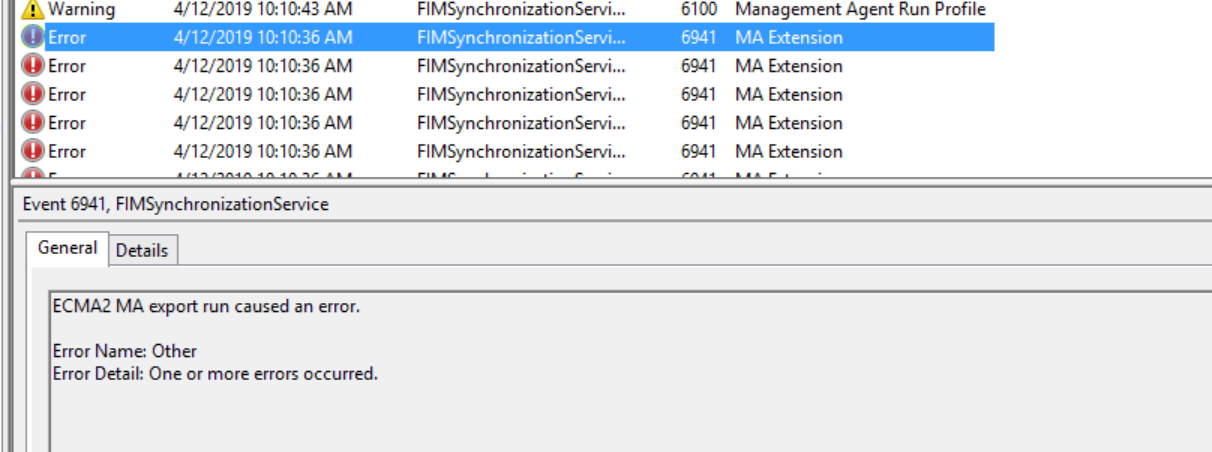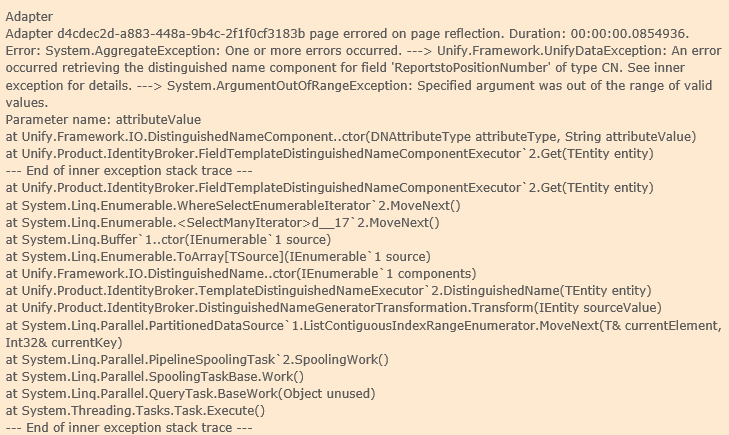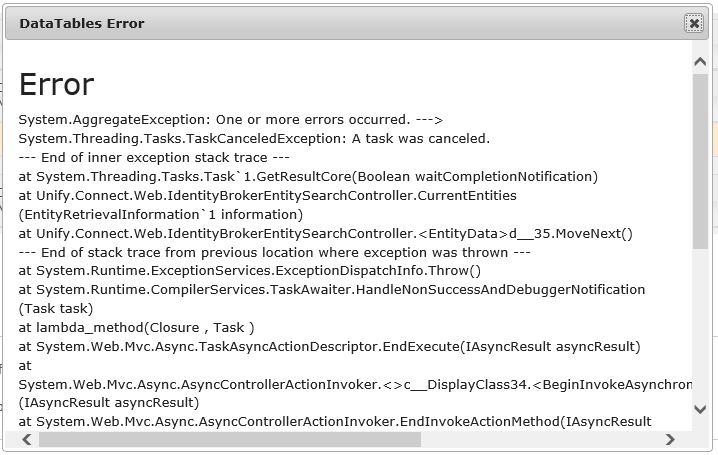Identity Broker Forum
Welcome to the community forum for Identity Broker.
Browse the knowledge base, ask questions directly to the product group, or leverage the community to get answers. Leave ideas for new features and vote for the features or bug fixes you want most.

 PowerShell Transformation: Coalescing Multi-Value DNs
PowerShell Transformation: Coalescing Multi-Value DNs
I have two dn.multi fields that I want to coalesce into a single list and also ensure it is unique. It would be something like this
$bothFields = $entity["placepositionoccupants"] + $entity["acpositionoccupants"]
$entity["occupants"] = $bothFields | select-object -unique
This doesn't work though. There's a couple things wrong with it. There's no addition operation for whatever object type the entity is and also when I do a select-object -unique it seems to longer be the type that Broker requires. Any hints on how I can achieve this is powershell? If I had the the object type that's required, I could create a new instance of that and then loop through the two lists adding as appropriate but I don't know the object type and couldn't find it any doco.

Thanks for the feedback Daniel. I've added it to our backlog for action.

 Entity key contains null value
Entity key contains null value

Can I get some assistance with what this error is inidcating? It says the entity key of the entity contains a null value. What is the entity key? I can find the user with the ID in MIM and there's a pending export that's failing where it's adding an attribute. There's no null or attribute deletion in MIM. The error in MIM isn't much help:


Hey Dan,
This means that an update to an entity from MIM is attempting to flow out to Broker, but a field marked as a "Key" in the adapter does not have a value.
Make sure any fields you've got defined as being the key have values assigned when flowing either adds or updates.

 SQL Connector Delta Import auto disable
SQL Connector Delta Import auto disable
The delta import functionality on the SQL connector requires a "Modified" column be present in the database, as a DateTime.
If the schema provider doesn't have this column, the "Poll Changes" operation on the connector should be disabled. Currently it just throws an error:


Not currently viable due to the design, backlogged improving the error message and documentation.

 SQL Connector Schema Provider not showing error
SQL Connector Schema Provider not showing error
Noticed today that if you've got a database connector, and the account you're connecting with has access to the database but no roles assigned (db_reader etc) then a request schema will not show an error - it will instead show that there are no schema fields.
Test agent completes without issue.
The only way to show the error (no SELECT permission), you have to manually add a schema field and attempt an import.
The schema provider should display this same error when attempting to get the schema.

 More context in error messages
More context in error messages
Can we get more information in error messages. An example is today, in a connector, I'm getting the error:
"An error has occurred: An item with the same key has already been added."
This is all the information I'm getting and though it tells me what the error is it doesn't give me any information that helps me resolve it. What would be useful is if it provided the key that it's faulting on.

 Adapter Error: DN Component, Argument Out of Range Exception
Adapter Error: DN Component, Argument Out of Range Exception
I have an adapter that is a position type that has a field for the ReportsTo position. I'm generating a DN on this field. I've got bad data here so it wouldn't be able to resolve the DN. My question is, should this prevent the entire adapter from loading in changes. Right now I've got 19 changes and 0 entities and this error being thrown. Does the bad DN reference prevent the whole thing from loading?
This is the error I'm getting:


It'll stop reflection because of the nature of the way it's currently calculated and the requirement that the changes are in order. As Matthew mentioned we are exploring ways to improve this process. For now you'll need to fix the transformation configuration so that it does not error out. Regarding the generated reference, UNIFYBroker does not do reference checking, as it's assumed that this is done by the identity management platform.

 Adapter Error: A task was cancelled
Adapter Error: A task was cancelled
I've created an adapter and only just had the connector populated. The adapter shows >1000 entities but when I click on the link to go to the Entity Search, it sits at Processing for a few minutes and then the following pop-up appears. There's nothing about it in Event Viewer or the IdB logs


Daniel has confirmed that the patch fixed the issue.

 Error retrieving certificate for LDAP Security
Error retrieving certificate for LDAP Security
What is this error indicating and how do I resolve it?

I am having some connectivity problems in one of my agents that should be over SSL, not sure if it's unrelated.


 Web Services Connector
Web Services Connector
A web services connector may be something worth adding, if possible.
Ideally, it would have the option to take a service contract from a swagger document, WSDL file (either SOAP or WCF) and hard-mapped REST endpoints.
It would be fairly complex, as there would need to be some form of data object mapping (mainly for WCF and SOAP) and also argument mapping for calling methods that require specific object instances (like for import and export methods).
An option would be to enable raw c# input that does the object creation and mapping from schema object to data object (similar to how the powershell connector works) but with the base connector still responsible for the importing and parsing of the service contract.
Technically this could be achieved already with the existing powershell connector, however in its current usage it is not a repeatable or clean solution. May be worth seeing if improvements can be made to the powershell connector to support this use case.

Should be covered by a simpler connector integration framework.

 Dumping Adapter Data
Dumping Adapter Data
What would be the quickest way to dump the data in an adapter so I can compare two adapters? The use case is the replacement of an adapter and the new adapter should be a like-for-like replacement of the original with the same resulting data as a the old one. Would it be a PowerShell script that pulls the adapter via the ldap gateway?

Hey Daniel,
That's correct. The quickest and most supported way is to query the LDAP gateway for the adapter you're needing the data from.
Customer support service by UserEcho

